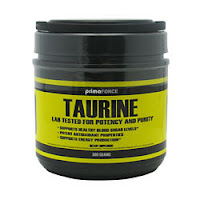
If the relationship is balanced, the patient’s blood sugar remains stable. Further, he states that the supplement may even prevent these complications in the first place, possibly as a result of its natural role in glucose homeostasis, “a state of balance between insulin and glucagon.” Insulin is the hormone that reduces blood sugar, but glucagon is the hormone that raises them. Melepura claims that diabetic patients “tend to have lower levels of taurine, indicating that the deficiency… put you at risk of and its complications”. Melepura is double board certified in Anesthesiology and Pain Management and his practice is focused on traditional medical interventions to address sports injuries in combination with holistic approaches.ĭr. Febin Melepura, medical director at Sports and Pain Institute of New York, supports this possibility. The supplement may also help prevent nerve damage and possibly reverse damage from diabetes, because it may help protect the body against metabolic and chemical stress.There are a limited number of studies with human subjects to definitively conclude whether it has an effect on blood sugar and diabetes. If a patient’s high blood sugar continues unchecked for a long time, it can damage the nerves. Studies report that taurine as a supplement may assist with weight loss in diabetics and possibly reduce blood sugar levels. But why take supplements? Studies suggest that taurine supplements may help address several different aspects of health, such as digesting fats, reproduction and immunity. What does taurine do in the body? Your body produces taurine and you can get it from food. Taurine is found in a variety of foods that you might already eat regularly-especially those rich in protein-which makes it easy to consume: Still, taurine levels do diminish under these conditions. Some studies suggest that the body might conserve the compound to maintain a healthy system while your body is stressed and ill. When you experience a severe illness or tension, the body is not able to produce taurine on its own. The central nervous system also has traces of taurine. There are also concentrations in other areas of your body, such as skeletal muscles, white blood cells and the heart, especially in the cardiac muscles. There is evidence of taurine in both human and animal cells in bile and the large intestines, where digestion takes place. It’s commonly classified as a conditionally essential amino acid because your body can produce it naturally, especially in response to stress or illness. Taurine is an organic acid as well as a sulfonic acid because it contains sulfur. Cysteine is a semi essential amino acid that contains sulfur, which may contribute to protein building in your body. Methionine is an essential amino acid that causes urine to become acidic, so it may be useful in addressing urinary tract infections (UTI). Taurine comes from methionine and cysteine, two interrelated amino acids. What are the benefits of taking taurine as a supplement? Keep reading to find out. When it’s released, bile helps emulsify fats and aid digestion. Bile generates in the liver and it is stored in the gallbladder. German chemists Friedrick Tiedemann and Leopold Gmelin discovered taurine when they isolated the compound from the bile of an ox.

What are taurine supplements? The word “ taurine” derives from the Latin word “taurus,” meaning ox or bull, for the compound derived from a castrated adult male bull.


 0 kommentar(er)
0 kommentar(er)
